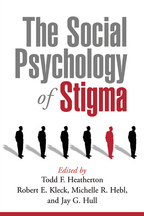The Social Psychology of Stigma
Edited by Todd F. Heatherton, Robert E. Kleck, Michelle R. Hebl, and Jay G. Hull
“Detailed investigations of stigma serve as a gathering point for students to explore a wide variety of mainstream social-clinical topics, including a) stereotypes; b) prejudice and discrimination; c) social salience; d) social interaction (or lack thereof); e) the self, self-perception, and self-esteem; f) stress and health; and g) ingroup–outgroup issues....A fine work that should be as liberally used in the classroom as it is bound to be in the laboratory.”
—Journal of Social and Clinical Psychology
“Thought-provoking and insightful....Merits and demands careful reading.”
—American Journal of Psychiatry
“Because of the encyclopedic compendium of stigma research contained in this book, its clear organizational format, and some of the chapters' original theoretical contributions, it should be standard reading for anyone who conducts research on or teaches about stigma.”
—Contemporary Sociology
“Provides original and valuable insights into an issue that psychologists, psychiatrists, and social workers face in clinical practice. This book can also serve as a good reference for cultural competence training for graduate students in health-related disciplines.”
—Psychiatric Services
Table of Contents
1. Stigma: Introduction and Overview, Dovidio, Major, and CrockerI. The Perceiver
2. Why People Stigmatize: Toward a Biocultural Framework, Neuberg, D. M. Smith, and Asher
3. Threat and the Social Construction of Stigma, Stangor and Crandall
4. Stigma and Stereotypes, Biernat and Dovidio
5. Ideology and Lay Theories of Stigma: The Justification of Stigmatization, Crandall
II. The Stigmatized
6. Social Stigma and the Self: Meanings, Situations, and Self-Esteem, Crocker and Quinn
7. The Looking-Glass Self Revisited: Behavior Choice and Self-Perception in the Social Token, Cioffi
8. The Hidden Costs of Hidden Stigma, Smart and Wegner
9. Coping with Stigma and Prejudice, Miller and Major
III. The Social Interface
10. Awkward Moments in Interactions between Nonstigmatized and Stigmatized Individuals, Hebl, Tickle, and Heatherton
11. Stigma, Threat, and Social Interactions, Blascovich, Mendes, Hunter, and Lickel
12. "Too Young, Too Old": Stigmatizing Adolescents and Elders, Zebrowitz and Montepare
13. Stigma and Self-Fulfilling Prophecies, Jussim, Palumbo, Chatman, Madon, and A. Smith
14. The Social Consequences of Physical Disability, Hebl and Kleck
About the Editors
Todd F. Heatherton, PhD, until his retirement in 2018, was Professor of Psychological and Brain Sciences at Dartmouth College.Robert E. Kleck, PhD, is Professor of Psychological and Brain Sciences at Dartmouth College.
Michelle R. Hebl, PhD, is Assistant Professor of Psychology at Rice University.
Jay G. Hull, PhD, is Professor of Psychological and Brain Sciences at Dartmouth College.
Audience
Scholars and students in social and clinical psychology and sociology; mental health practitioners; others concerned with the nature and impact of stereotyping and discrimination.Serves as a text in advanced undergraduate and graduate-level courses on social deviance, stereotyping, and stigma, and in graduate-level social psychology seminars.
